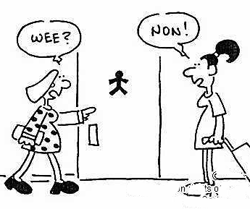 The number of Welsh speakers started to decline just past the middle of the 19th century. Although the language is enjoying a resurgence, it is still not enough to fully revive this beautiful language. In 2006, there were about 57 per cent of the population in Wales who spoke the Welsh language to a fluent level. In 2011, the language that had fascinated JRR Tolkien and inspired him when crafting the elvish language for The Lord of the Rings trilogy had about 562,000 speakers, representing 15 per cent of the total population. Interestingly, Welsh is the de jure official language in Wales whilst English only has a de facto official status.
The number of Welsh speakers started to decline just past the middle of the 19th century. Although the language is enjoying a resurgence, it is still not enough to fully revive this beautiful language. In 2006, there were about 57 per cent of the population in Wales who spoke the Welsh language to a fluent level. In 2011, the language that had fascinated JRR Tolkien and inspired him when crafting the elvish language for The Lord of the Rings trilogy had about 562,000 speakers, representing 15 per cent of the total population. Interestingly, Welsh is the de jure official language in Wales whilst English only has a de facto official status.
History of the Welsh Language
Welsh, to its speakers, is called Cymraeg, a member of the Brittonic family of Celtic languages that first appeared during the 6th century. Its evolution started from the British, which was the Celtic language of the Britons of old. It began to fragment in the Early Middle Ages because of differences in dialect, leading to the formation of Welsh, Cornish, Breton and Cumbic (now extinct), although how Welsh became a distinct language was not clear.
Welsh alphabet
Compared to Standard English, Welsh has 21 consonants and 7 vowels (a / e / I / o / u / w / y. It has 13 diphthongs and its consonants include the letters Ch / Dd / Ff / Ll / Ng / Rh / and Th. However, it does not have the letters J / K / Q / V / X and Z officially, but still you’ll find them in imported words! That’s because there are times when a suitable Welsh letter is not available.
Pronunciation of the Welsh Language
If you look at the written Welsh, it might seem quite intimidating and you’d think that it’s impossible even to attempt reading the language, let alone speak it. The truth is, however, that its spelling is phonetic and regular. All letters in Welsh are pronounced, allowing listeners to understand and differentiate the words.
Welsh is a language that’s waiting to be rediscovered and rejuvenated. In the words of J. R. R. Tolkien, “Welsh is of the soil, this island, the senior language of the men of Britain; and Welsh is beautiful.”
